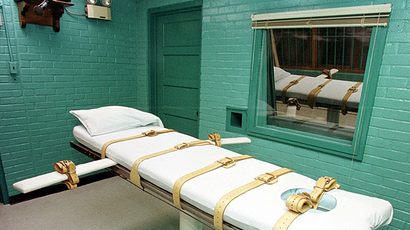Missouri execution with controversial drug halted in last-minute decision
A US inmate had a narrow escape from death via lethal injection, as his execution was suspended hours before its scheduled time. Attorneys claim their defendant’s rare birth defect would make his execution excruciatingly painful.
The order to halt the execution of Russel Bucklew, 46, was issued
by US Supreme Court Justice Samuel Alito late on Tuesday after a
series of court flip flops. Earlier in the day Bucklew was first
granted a stay of execution by a three-judge panel of 8th Circuit
court and in a few hours the full 8th Circuit court ruled that
the execution could still proceed.
Alito did not explain why he issued the order to suspend the
execution, but according to Missouri Attorney General Chris
Koster, cited by AP, it could be because the full Supreme Court
was to consider Bucklew’s case on Wednesday.
If the high court rules in favor of the execution, it could still
be carried out on Wednesday, as scheduled, as according to
Missouri law, the state has 24 hours to carry out the death
warrant.
Bucklew’s attorneys as well as civil rights groups were appealing
to have the procedure delayed. Lawyers representing the 46 year
old inmate say he suffers from a rare medical condition that
causes weakened and malformed blood vessels, as well as tumors in
his nose and throat. The concern is that Bucklew will end up
experiencing prolonged suffering during the killing.
There are fears Bucklew’s execution could turn out similar to the
botched one in Oklahoma one month ago, when Clayton D. Lockett,
38, died of a heart attack after enduring pain for 43 minutes. An average execution takes just
minutes to complete.
In January, Ohio inmate Dennis McGuire, 53, reportedly took
25 minutes to die. The execution was then
described as one of the longest in the history of the state.
Executions started to go wrong, after European firms stopped
supplies of drugs which could be used for lethal injections to
US, boycotting the practice of capital punishment. The lethal
substances are now being provided by compounded pharmacies and
that is a problem, according to Cassandra Stubbs, director of the
Capital Punishment Project at the American Civil Liberties Union
(ACLU).
“Compound pharmacies are not regulated in the same way that
traditional manufacturers are,” Stubbs told RT. “And
there’s been big contamination problem with the drugs that come
out of these compound pharmacies. But because of their secrecy,
we don’t know where the drugs are coming from, we don’t know how
they are being made and that means we could see the kinds of
botched executions that we’ve seen in the past.”
Missouri authorities say they plan to use compounded
pentobarbital for Bucklew’s execution. It is the same drug that
proved problematic during previous killings.
Bucklew wanted his execution to be videotaped in case anything
goes wrong. That request was denied by a US federal judge.
Capital punishment in America is legal in 32 states. Lethal
injection is the most popular method. Second place goes to the
electric chair. But even gas chambers, the gallows and firing
squads are still lawful in some states. And according to research
by the US National Academy of Science, one in 25 defendants
handed the death sentence is likely to be innocent.














